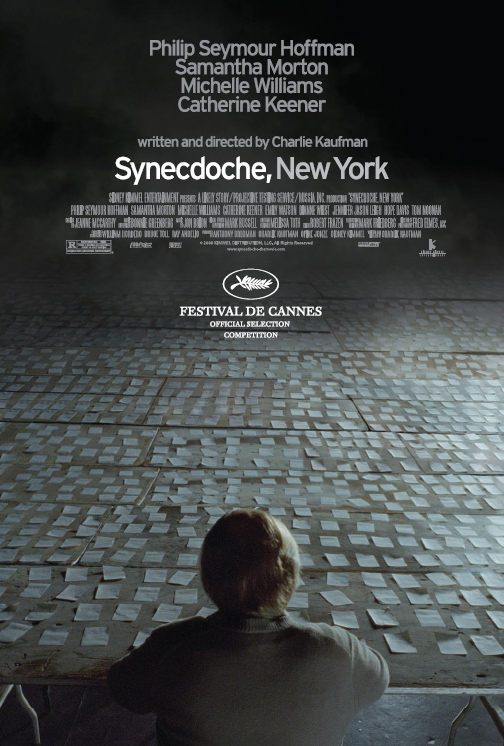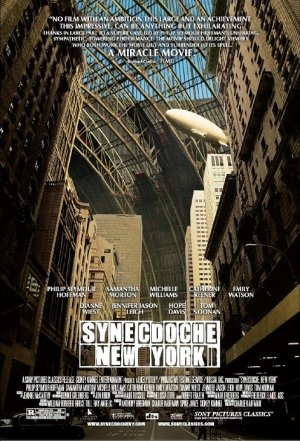
SYNECDOCHE, NEW YORK (2008, directed by Charlie Kaufman, 124 minutes, U.S.)
 BY DAN BUSKIRK FILM CRITIC Even though I’m all for expanding the vocabulary of the American public, Synecdoche, New York has got to be the most alienating title for a film since the Coen Brothers’ Hudsucker Proxy. For the record, “synecdoche” (rhymes with Schenectady, pronounced “si-nek-duh-kee”) is defined as “a figure of speech in which a part is used for the whole (as ‘hand’ for sailor), or the whole for a part (as ‘the law’ for police officer)”. It’s an obscure word for a difficult-to-grasp concept but screenwriter Charlie Kaufman is giving the viewer fair warning that you’re going to have to commit to some heavy intellectual lifting to divine the meaning of his directorial debut. I wish I could report that it was worth the trouble.
BY DAN BUSKIRK FILM CRITIC Even though I’m all for expanding the vocabulary of the American public, Synecdoche, New York has got to be the most alienating title for a film since the Coen Brothers’ Hudsucker Proxy. For the record, “synecdoche” (rhymes with Schenectady, pronounced “si-nek-duh-kee”) is defined as “a figure of speech in which a part is used for the whole (as ‘hand’ for sailor), or the whole for a part (as ‘the law’ for police officer)”. It’s an obscure word for a difficult-to-grasp concept but screenwriter Charlie Kaufman is giving the viewer fair warning that you’re going to have to commit to some heavy intellectual lifting to divine the meaning of his directorial debut. I wish I could report that it was worth the trouble.
Seemingly inspired by another cinematic surrealist, Federico Fellini, Kaufman has transformed the details of his life into a theatrical circus. In a masterfully mopey performance Philip Seymour Hoffman plays theater directorCaden Cotard. We never see enough of Caden’s work to know whether he is brilliant or a fraud but his staging of Death of a Salesman (with a twentysomething cast) lands him a MacArthur “Genius” grant, while at home his marriage is  collapsing. As Caden’s wife (Catherine Keener in an unsympathetic role) moves out with their daughter, he uses the grant money to rent a sprawling warehouse where he spends decades rehearsing a play based on his life.
collapsing. As Caden’s wife (Catherine Keener in an unsympathetic role) moves out with their daughter, he uses the grant money to rent a sprawling warehouse where he spends decades rehearsing a play based on his life.
As in all of Kaufman’s work, reality takes a beating as Caden merges with his ever-changing play, romancing the woman who plays his wife (the forever winsome Samantha Morton), then casting another woman to play the woman who was playing his wife and then romancing her, and so on and so on as Kaufman sends his lead character down another of his beloved wormholes. Meanwhile death hangs over everything asCaden finds blood in his urine then spends the next forty years or so dying while the play he is working spends a lifetime never getting past the rehearsal stage.
All of Kaufman’s work flirts with morbidity but where prior directors Michel Gondry (Eternal Sunshine of a Spotless Mind) and Spike Jonze (Being John Malkovich, Adaptation) infused his scripts with enough buoyant visual wit that the end product emerged life-affirming, Kaufman the director flounders without their visual knack. This leads Synecdoche‘s grimness to grow ever grimmer, painting a view of life where all ventures are disappointments, all people are less than expected and all experience lacks the integrity of reality. I’m all for tragedy and examinations the harsh realities of life, and while Synecdoche never stops being clever, its unyieldingly morose outlook feels too self-absorbed, single-minded and ultimately downright false. The film may supply pleasure for those who savor untangling the bleak riddle at its heart, yet Synecdoche’s fatal flaw is that it lacks a crucial ingredient: the joy of creation.
 RELATED: I’ve always been a sucker for filmmakers who shake up the snow globe of my so-called life. Nobody can be expected to do it consistently for years on end — hell, everyone’s arm gets tired after a while. In the ’80s it was David Lynch. In the ’90s it was the Coen brothers. In the 21st century the man who’s been consistently blowin’ my frickin’ mind is screenwriter Charlie Kaufman. Just the concept of Being John Malkovich alone makes me want to turn to the waiter and say, “I’ll have whatever he’s been smoking.” Then came Adaptation, with all its brutal faux self-laceration, creative constipation and mind-enema ending, followed closely by Confessions of a Dangerous Mind, the psychedelically absurd CIA-assassin fantasia of Gong Show host Chuck Barris. And just when the dizzy spells seemed to pass and it was safe to take the stairs again, along came Eternal Sunshine of the Spotless Mind, a heartache head-fuck valentine that will replace nothing except LSD and self-pity. Talk about a beautiful mind — when Kaufman dies, hopefully not for 100 years or so, the coroner is going to saw open that oblong afro-topped skull, and inside there’s gonna be a brain jigglin’ like Jell-O that’s bigger, rounder and prettier than J. Lo’s butt. –JONATHAN VALANIA
RELATED: I’ve always been a sucker for filmmakers who shake up the snow globe of my so-called life. Nobody can be expected to do it consistently for years on end — hell, everyone’s arm gets tired after a while. In the ’80s it was David Lynch. In the ’90s it was the Coen brothers. In the 21st century the man who’s been consistently blowin’ my frickin’ mind is screenwriter Charlie Kaufman. Just the concept of Being John Malkovich alone makes me want to turn to the waiter and say, “I’ll have whatever he’s been smoking.” Then came Adaptation, with all its brutal faux self-laceration, creative constipation and mind-enema ending, followed closely by Confessions of a Dangerous Mind, the psychedelically absurd CIA-assassin fantasia of Gong Show host Chuck Barris. And just when the dizzy spells seemed to pass and it was safe to take the stairs again, along came Eternal Sunshine of the Spotless Mind, a heartache head-fuck valentine that will replace nothing except LSD and self-pity. Talk about a beautiful mind — when Kaufman dies, hopefully not for 100 years or so, the coroner is going to saw open that oblong afro-topped skull, and inside there’s gonna be a brain jigglin’ like Jell-O that’s bigger, rounder and prettier than J. Lo’s butt. –JONATHAN VALANIA
